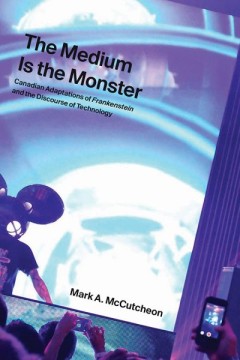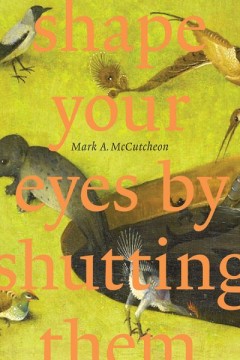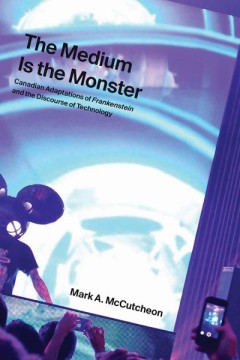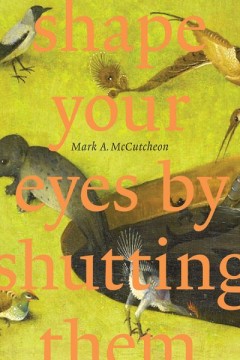Filter by

The Medium Is the Monster Canadian Adaptations of Frankenstein and the Disco…
Technology, a word that emerged historically first to denote the study of any art or technique, has come, in modernity, to describe advanced machines, industrial systems, and media. McCutcheon argues that it is Mary Shelley’s 1818 novel Frankenstein that effectively reinvented the meaning of the word for modern English. It was then Marshall McLuhan’s media theory and its adaptations in Cana…
- Edition
- -
- ISBN/ISSN
- 9781771992244.01
- Collation
- -
- Series Title
- -
- Call Number
- 6 x 9, 248 pages

Shape Your Eyes by Shutting Them
In this inventive collection of poems, McCutcheon engages in sophisticated literary play and deploys the Surrealist practices of juxtaposition, cut-up, and defamiliarization. Moving from eroticism to the macabre and from transformative quotation to the individual idiom, Shape Your Eyes by Shutting Them explores intertextuality in poetry by challenging the cultural tradition of seeing quotation …
- Edition
- -
- ISBN/ISSN
- 9781771992695.01
- Collation
- -
- Series Title
- -
- Call Number
- 6x9, 92 pages

The Medium Is the Monster Canadian Adaptations of Frankenstein and the Disco…
Technology, a word that emerged historically first to denote the study of any art or technique, has come, in modernity, to describe advanced machines, industrial systems, and media. McCutcheon argues that it is Mary Shelley’s 1818 novel Frankenstein that effectively reinvented the meaning of the word for modern English. It was then Marshall McLuhan’s media theory and its adaptations in Cana…
- Edition
- -
- ISBN/ISSN
- 9781771992244.01
- Collation
- -
- Series Title
- -
- Call Number
- 6 x 9, 248 pages

The Medium Is the Monster Canadian Adaptations of Frankenstein and the Disco…
Technology, a word that emerged historically first to denote the study of any art or technique, has come, in modernity, to describe advanced machines, industrial systems, and media. McCutcheon argues that it is Mary Shelley’s 1818 novel Frankenstein that effectively reinvented the meaning of the word for modern English. It was then Marshall McLuhan’s media theory and its adaptations in Cana…
- Edition
- -
- ISBN/ISSN
- 9781771992244.01
- Collation
- -
- Series Title
- -
- Call Number
- 6 x 9, 248 pages

Shape Your Eyes by Shutting Them
In this inventive collection of poems, McCutcheon engages in sophisticated literary play and deploys the Surrealist practices of juxtaposition, cut-up, and defamiliarization. Moving from eroticism to the macabre and from transformative quotation to the individual idiom, Shape Your Eyes by Shutting Them explores intertextuality in poetry by challenging the cultural tradition of seeing quotation …
- Edition
- -
- ISBN/ISSN
- 9781771992695.01
- Collation
- -
- Series Title
- Mingling Voices
- Call Number
- 6x9, 92 pages
 Computer Science, Information & General Works
Computer Science, Information & General Works  Philosophy & Psychology
Philosophy & Psychology  Religion
Religion  Social Sciences
Social Sciences  Language
Language  Pure Science
Pure Science  Applied Sciences
Applied Sciences  Art & Recreation
Art & Recreation  Literature
Literature  History & Geography
History & Geography